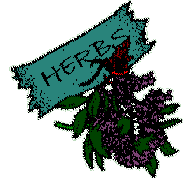 Herbs--R
Herbs--R 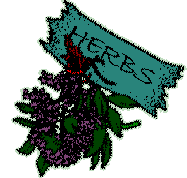
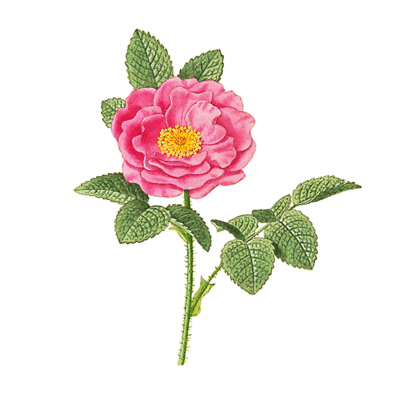 |
Common Names: Rose Latin Name: Rosa spp. Parts Used: Petals, leaves, and hips Cultivation: About the only thing that the different varieties of rose have in common is that they are perennials. There are hardy roses and tender roses, roses for sun, shade, climbing, bush...new hybrid roses that require lots of TLC and "old" roses which thrive on neglect. Cosmetic Uses: Use rosewater as a cleansing and astringent facial toner. Culinary Uses: Rosehips taste much like cranberries and have a high vitamin C content. They're good in syrups, jams, jellies, teas, and quick breads. Rosewater is used as a flavoring for sweets and candied rose petals are delicious edible garnishes. Magickal Uses: Roses are used in many love mixtures and spells. Drink rosebud tea to induce prophetic dreams. Rosebushes grown in your garden will attract faeries. Use rosehips in healing mixtures. Medicinal Uses: Rosehips are very rich in vitamins, especially vitamin C. Use them in cough syrups and infusions to treat bladder infections. They are mildly diuretic and laxative. Rose leaves are also slightly laxative and are useful as an astringent poultice. Use rose oil in creams for dry, inflamed skin, vaginal itching, or acne. |
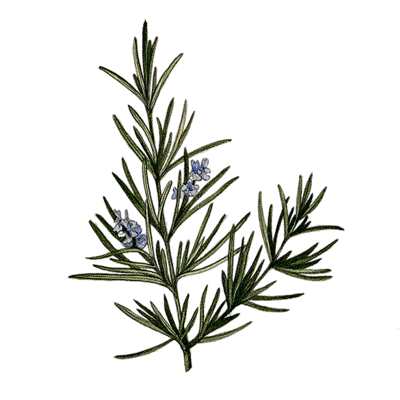 |
Common Names: Rosemary, Guardrobe, Sea Dew Latin Name: Rosemarinus officinalis Parts Used: Leaves and stems Cultivation: Rosemary is a tender oerennial native to the Mediterannean. It is hardy to zone 8, growing in well-drained soil in full sun. The seeds have an extremely slow germination, so you may wish to purchase a plant rather than start it from seed. Cosmetic Uses: Rosemary baths refresh and stimulate, and it makes an excellent steam facial. The volatile oils increase circulation to the skin. Rosemary hair rinses brighten brunette hair. Culinary Uses: Rosemary is one of my favorite herbs! It combines especially well with garlic, as well as bay, parsley, and thyme. Use it with lamb , potatoes, beef, or fish; in herb butters and breads; or anywhere you want a tangy, slightly piney flavor. Magickal Uses: Rosemary is a powerful cleansing and purifying herb; burn some to cleanse your altar before doing magic. Place it under your bed or above your door to protect you from harm. Add some to love and healing mixtures. Medicinal Uses: Rosemary improves circulation and strengthens blood vessels. Rosemary oil has antibiotic and antifungal properties. It reduces flatulence and stimulates the digestion. Use an infusion of rosemary and borax to treat dandruff. |
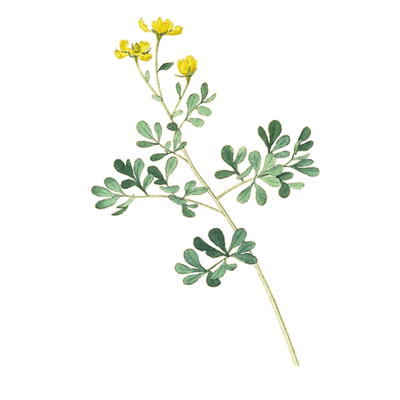 |
Common Names: Rue, Garden Rue, Herb of Grace, Mother of Herbs Latin Name: Ruta graveolens Parts Used: Leaves and flowers Cultivation: Rue is an evergreen "subshrub." It is hardy to zone 4, and prefers well-drained clayey loam in full sun with a pH of 7.0. Magickal Uses: A healing herb, rue will ward off headaches and other illnesses. Add it to exorcism mixtures or baths to break hexes. Use a sprig of fresh rue as an aspergillum to dispel evil influences. During the Middle Ages, rue was thought to offer protection from witches and evil spells, and to ward off the plague. Medicinal Uses: Ointments made from rue are useful in treating gout, rheumatism, sprains, and chilblains. It is a uterine stmulant and can be used to treat delayed menstruation. Use it for nervous indigestion and colic. It is specific for eyestrain and the accompanying headache. Cautions: Do not use when pregnant. Rue can cause photosensitivity, blistering, and rash when handled fresh. Large doses can cause stomach pains, vomiting, mental confusion, collapse, and convulsive twitching. |